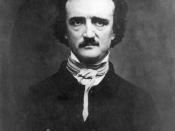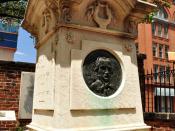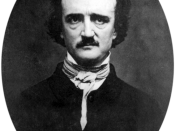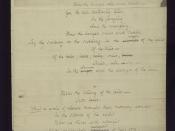"Alone" by Edgar Allan Poe
From childhood's hour I have not been
As others were; I have not seen
As others saw; I could not bring
My passions from a common spring.
From the same source I have not taken
My sorrow; I could not awaken
My heart to joy at the same tone;
And all I loved, I loved alone.
Then- in my childhood, in the dawn
Of a most stormy life- was drawn
From every depth of good and ill
The mystery which binds me still:
From the torrent, or the fountain,
From the red cliff of the mountain,
From the sun that round me rolled
In its autumn tint of gold,
From the lightning in the sky
As it passed me flying by,
From the thunder and the storm,
And the cloud that took the form
(When the rest of Heaven was blue)
Of a demon in my view.
What is meant by being alone? Some would describe being alone in a figurative manner, such as being with other people but feeling alone inside. While others would give being alone a literal definition, such as actually being isolated from other humans. In the poem "Alone," Edgar Allan Poe talks about being alone in terms of not being able to experience things as others do. Edgar Allan Poe had a dark, disturbing, and somewhat twisted manner of writing. Some readers and critics consider his writing pessimistic. His writing also has a sense of honesty and sadness to it.
Poe was a person who had many troubling experiences throughout his life. It seemed that all the women he loved ended up dying, and they all died from the same disease. Tuberculosis. To add to his misfortune, he was poor, did not have a stable job, and was an alcoholic. To escape from his saddened world, Poe drank and wrote short stories or poems with a pessimistic outlook. Having this dark attitude is what made Poe such a great and creative writer. Everything he was feeling he brought out in his work. In this poem, Poe presents gothic images of a person who feels alone in this world. He accomplishes this by contrasting how the speaker views himself, with how he views the rest of the world emphasizing the isolation he feels from the rest of the world. Poe draws many contrasts throughout the poem to emphasize the speaker's isolation from the rest of the world. In the beginning of the poem the author tells us that even during his childhood he was different than other people. "From my childhood's hour I have not been / As others were" (line 1). He also says he viewed things from a different perspective than other people did. "I have not seen/ As others saw." Also, he states he was unable to feel deep strong love from the same source as other people. "I could not bring/ My passions from a common spring"(3). "Spring" here symbolizes an origin or source of passion. His source of passion has never been the same as those around him. The speaker compares his view with the views of others, to allow the reader to draw a line between the two and see the difference. His view is completely different from everyone else's. This difference is what makes the speaker an outsider. This is the reason he feels isolated. We may then ask the question, what causes him to view things as he does? The speaker never answers this question, but instead offers the term "mystery" as the cause. In addition, the author tells the reader that "mystery" which still affects him, is derived from everything good and bad in his life. "From every depth of good and ill/ The mystery which binds me still." The "mystery" stops the speaker from being able to see the world as everyone else does. It controls him and makes him view everything in a negative context. It causes the speaker to view water as a rushing violent torrent, while others would see it as a peaceful fountain. "From the torrent, or the fountain"(13), the word "torrent" depicts an image of violent rushing energy, while "fountain" portrays an image of peacefulness. When the speaker relates these images to his own perspective and the perspective of others, it emphasizes the difference between his feelings and those of others.
Towards the end of the poem the speaker presents images of nature such as "the red cliff of the mountain" and "the sun". The speaker is effective in converting these images into beautiful and calm images when he says "Heaven was blue". However, he applies a technique of brackets at the end of the poem. "(When the rest of Heaven was blue)." He uses brackets while he talks about how he sees "the thunder", "the storm" and the gothic image of a "demon" formed by the cloud. These terms usually do not match with blue sky. Yet the lines in the bracket suggest that others see a peaceful blue sky while he sees the dark image of a "demon". This intensifies the isolation that the speaker feels because it draws a line separating from others views when the sky is viewed peacefully to others and demon to the speaker. The verses "From the torrent, or the fountain, From the red cliff of a mountain, From the sun that round me rolled..." can also be symbolic for the moment when he began to feel rage and anger, but did not know why he felt this way. Red usually represents anger or passion, the sun can represent burning heat, feelings that one may have when they become angry.
This poem evokes emotions of sadness and maybe loneliness, depending on the personality of the reader. It might even instill fear of being alone, of not being understood very well by others.
In this poem he writes more about life than about love, and incorporates nature frequently. He incorporates water, the sun, mountains, the sky. They are all symbolic for emotions and life. Thunder and storm play a significant role in this poem when dealing with emotion. They represent anger, sadness, sorrow and pain, the lack of clarity. The poem overall is about Poe being alone in the world because he was not how everyone else was "suppose to be. It also may have been a poem he wrote to release some of the emotions that he could not express to human beings verbally because he was already thought of as crazy and abnormal. Maybe no one really knew that he felt so emotionally disturbed. Perhaps he himself did not know exactly who he was, only that he felt emotions towards a world that no one else seemed to. Poe is very effective in presenting gothic images of a person by contrasting how the speaker views himself, with how he views the rest of the world. The speaker draws a line between himself and others signifying the differences. This emphasizes the speaker's isolation from the rest of the world. Poe also accomplishes dark images to let the readers think about the "mystery" which he presents during the poem. This "mystery" is unknown and may be dark-threatening the speaker to be isolated from the rest of the world, and so he feels "alone".





